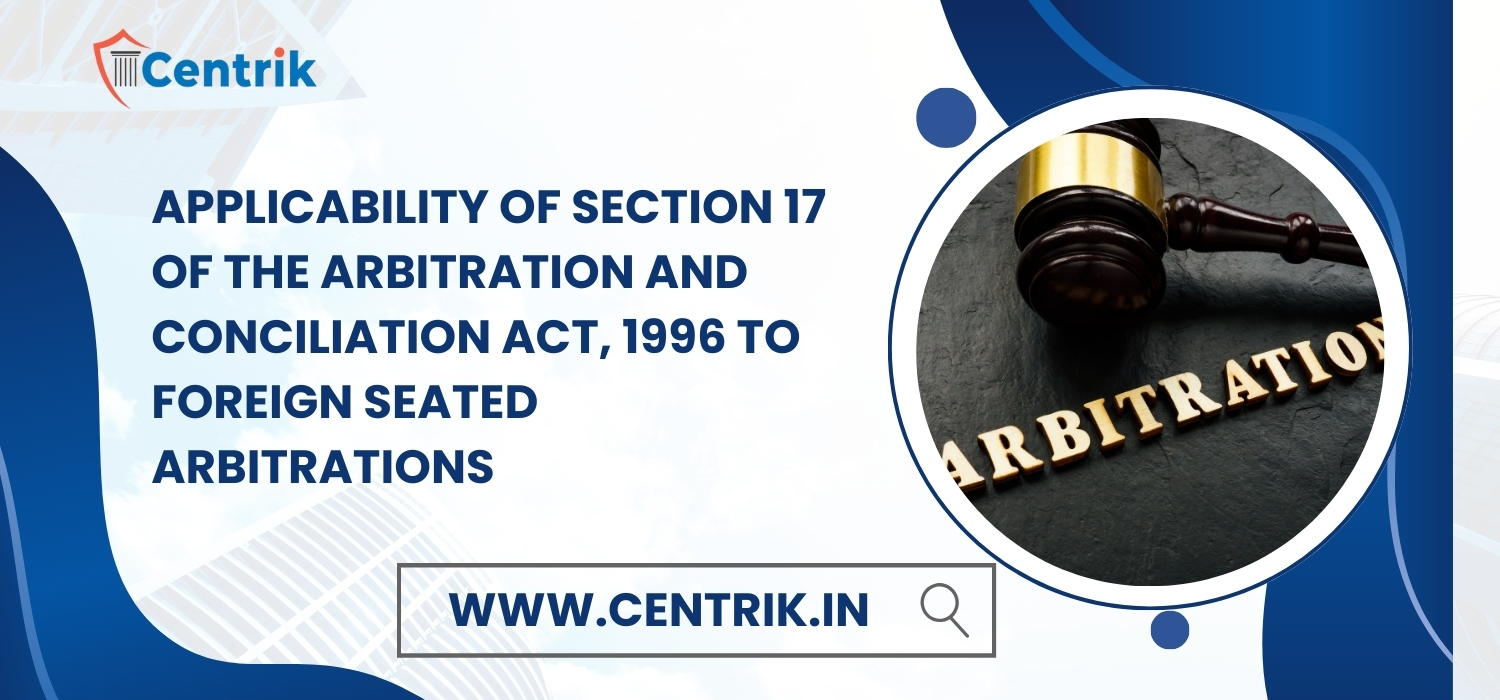Introduction:
The Arbitration and Conciliation Act, 1996, a pivotal legislation in India, is divided into two parts: Part I- which governs arbitrations seated in India, and Part II– which deals with the enforcement of foreign awards. The applicability of various provisions within these parts can sometimes be a subject of intricate legal interpretation, especially when it comes to arbitrations seated outside India. One such provision of the Act is Section 17, which empowers arbitral tribunals to order interim measures of protection.

Section 17: Interim Measures by Arbitral Tribunal:
Section 17 of the Arbitration and Conciliation Act, 1996, provides that an arbitral tribunal can order interim measures of protection as may be necessary in respect of the subject matter of the dispute. These measures can include preservation of assets, securing the amount in dispute, and maintaining or restoring the status quo. However, the primary question is whether this provision can be invoked in the context of foreign-seated arbitrations.
Foreign-Seated Arbitrations & Applicability of Section 17:
Foreign-seated arbitrations, as the name suggests, are arbitrations conducted outside the territorial jurisdiction of India. The primary legal framework governing these arbitrations is typically the law of the seat of arbitration. However, parties often seek interim relief from courts or tribunals in other jurisdictions, including India, to protect their interests pending the final award.
Section 17 falls under Part I of the Arbitration and Conciliation Act, 1996. The Supreme Court of India, in the landmark decision of Bhatia International v. Bulk Trading S.A. (2002), held that the provisions of Part I of the Act would apply even to arbitrations seated outside India unless the parties explicitly or impliedly excluded such application. This decision allowed Indian courts to grant interim relief in support of foreign-seated arbitrations.
However, this position was significantly altered by the Supreme Court in Bharat Aluminium Co. v. Kaiser Aluminium Technical Services Inc. (BALCO) (2012). The BALCO judgment clarified that Part I of the Act would not apply to foreign-seated arbitrations and that Indian courts could not grant interim measures for arbitrations seated outside India under Section 9 of the Act. Following the BALCO judgment, the 2015 amendment to the Act introduced Section 2(2), which explicitly states that Part I shall apply to arbitrations seated in India which means, it shall not apply to foreign-seated arbitrations unless an agreement to the contrary is expressly made.
Post-2015 Amendment Scenario:
Post the 2015 amendment, the question of the applicability of Section 17 to foreign-seated arbitrations became relatively clearer. The amendment reinforced the BALCO principle by emphasizing that Part I provisions, including Section 17, would not extend to foreign-seated arbitrations. However, it allowed parties the flexibility to agree otherwise. Moreover, the amendment introduced Section 2(2) proviso, allowing Indian courts to grant interim relief under Section 9 for foreign-seated arbitrations, provided such relief was sought before the commencement of arbitral proceedings or after the award was made but before its enforcement.
Conclusion:
The applicability of Section 17 of the Arbitration and Conciliation Act, 1996, to foreign-seated arbitrations is a nuanced issue shaped by judicial interpretation and legislative amendments. The BALCO judgment and subsequent amendments have clarified that Section 17 does not extend to foreign-seated arbitrations unless explicitly agreed by the parties. However, Indian courts remain empowered to grant interim relief under Section 9, providing a robust mechanism for parties seeking interim measures in support of foreign-seated arbitrations. This framework balances the need for judicial intervention with respect for the autonomy of the arbitral process, ensuring that parties’ interests are safeguarded across jurisdictions.




 join For Updates
join For Updates